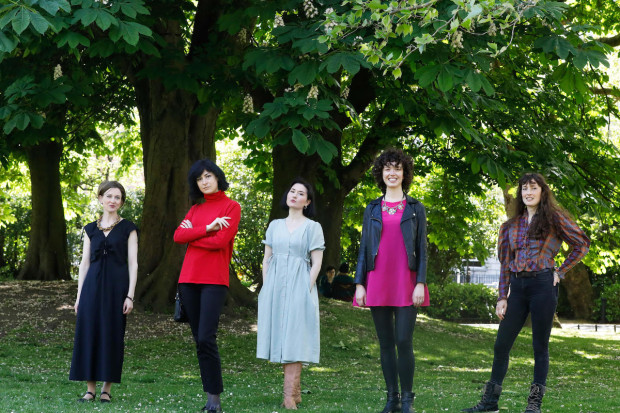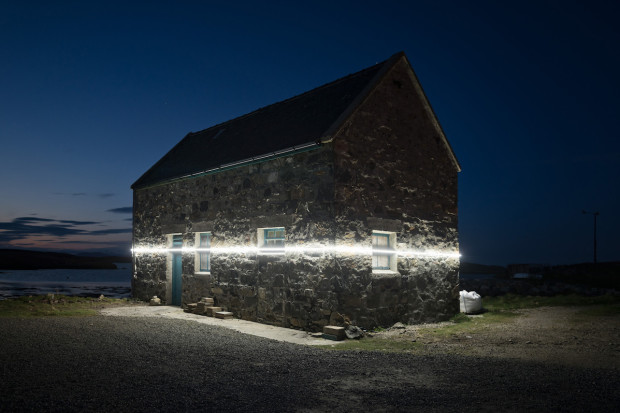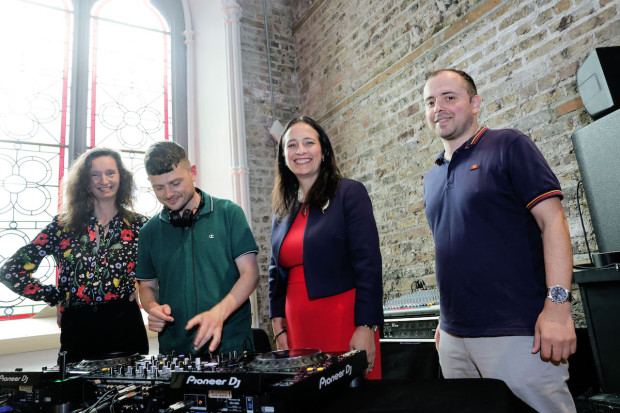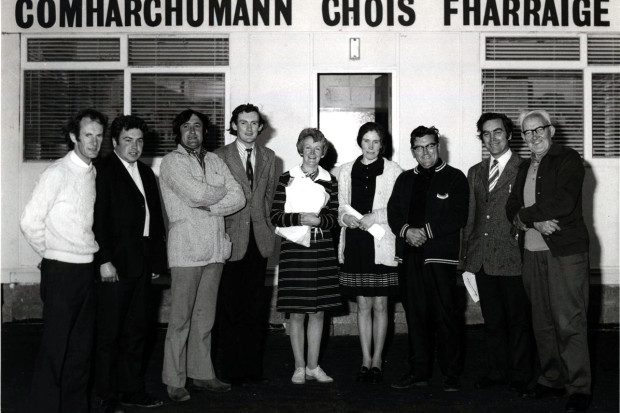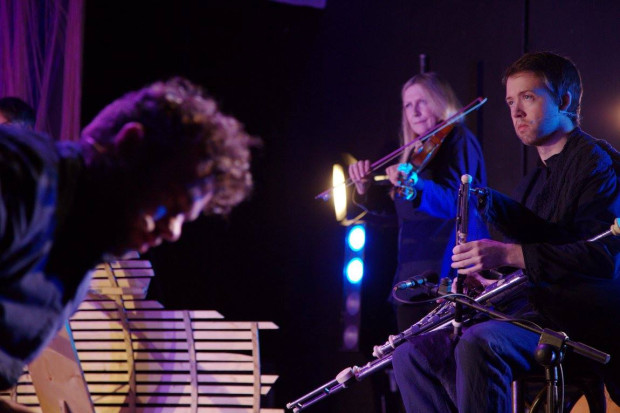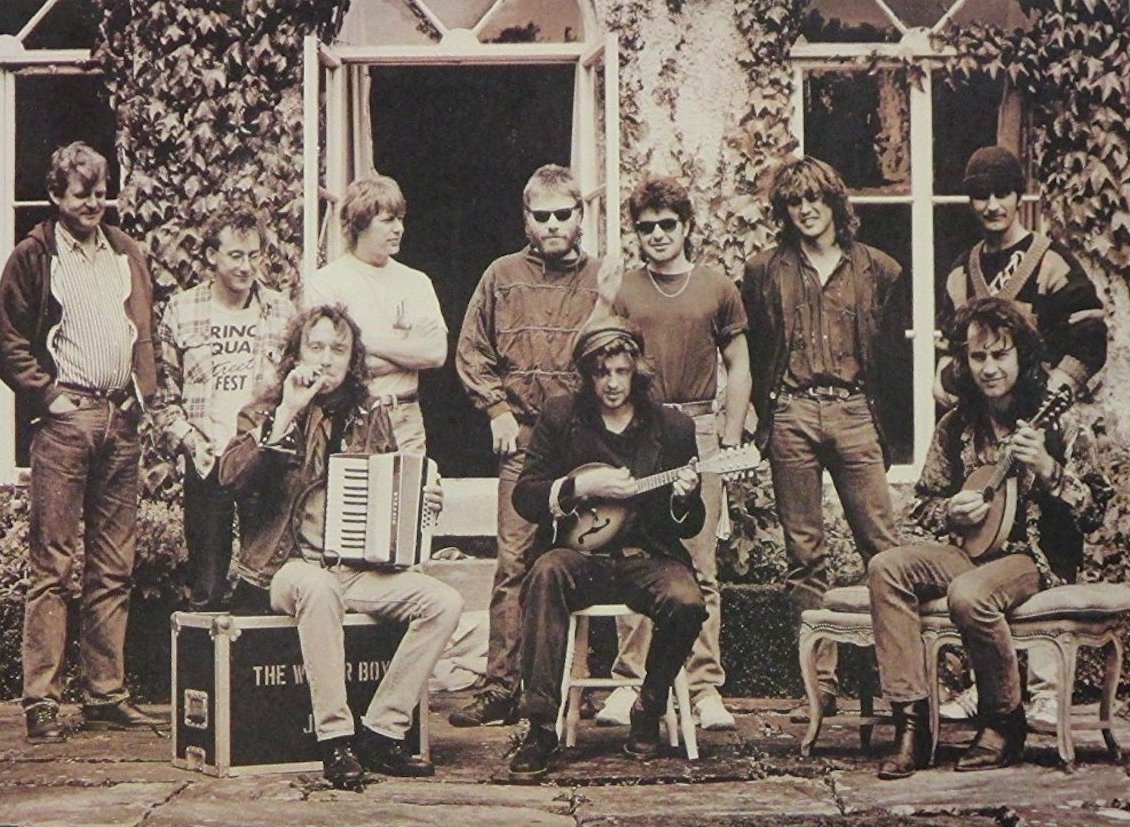
The Waterboys in An Spidéal, Co. Galway, in 1988 during the recording of Fisherman's Blues.
The Silencing of An Spidéal – Why Catherine Martin Needs to Set Out a New Vision for the Arts
A few months before the pandemic, a new building called Gteic opened in the village of An Spidéal in County Galway. The stylish white premises are home to a digital innovation hub with hot desks, meeting rooms and break-out areas for remote workers, local businesses, and start-ups. It is actually one of 30 digital hubs being established in Gaeltacht areas and on islands, built to encourage people to live in the area and to promote entrepreneurialism, all of which I believe in and welcome.
At the same time as we see an initiative like this, however, this small Gaeltacht village is going through a strange time. I moved here fourteen years ago and since then An Spidéal has become increasingly quiet, and I mean literally quiet. I chose the village to live and work in because of its musical culture. An Spidéal has always had a sense of fun and conviviality about it, mainly because of the music sessions that took place in the famous Tigh Hughes bar at the centre of the village. This is where the band De Dannan began, where the Waterboys played when recording their album Fisherman’s Blues, where the television series Bringing It All Back Home recorded sessions with Máirtín O’Connor, Adam Clayton from U2 and Sharon Shannon, and where the late Johnny Connolly hosted a session for many years. Over time, more pubs in Conamara began to host sessions, and by the time I moved here in 2006, there was a choice of events throughout the week, not just in An Spidéal but throughout the region. A good traditional music session is a magical experience. An Spidéal once had them in abundance. This vibrancy fed into all the other activity in south Conamara: TG4, Raidió na Gaeltachta, Ros na Rún, television production companies and more.
These sessions were about more than the music. Tigh Hughes sits at a crossroads and it is where local, newcomer and passer-through met, where conversations happened, where introductions were made, and where new ideas were often discussed. The sessions created a sense of cultural dynamism in the village. They also provided a social opportunity to speak Irish; in my experience, there is a connection between the musical culture of Conamara and language usage.
But gradually in the late 2000s, things changed. New legislation on drink driving started to affect pubs. I have no disagreement with these laws, but the unintended consequences were considerable, and it was negligent not to make provision for these. The five pubs in An Spidéal (four that had music and one which focused on screening sport) started to become quieter. There were fewer people to listen to the musicians, and so gradually there were fewer sessions. Musicians stayed home. Within a few years, Tigh Hughes sadly closed. Last year another great music pub, Tigh Giblin, closed. A third has changed management a number of times. The local hotel now closes for the entire winter. Two music schools and two musical instrument shops have closed, and a music summer school has come and gone.
The irony is that there are probably more musicians, singers and dancers in Conamara than ever before, mainly because so many moved here and taught others over the years before this decline. Every July, the village comes alive with music for three days during the Traidphicnic festival; and I was among a number of parents who started a music session for children several years ago, and there are now dozens of young musicians growing up and playing wonderful music, under the title Ceoltóirí Óga Chois Fharraige. But where are they going to play in the future?
Cultural ecosystem
I am telling this story about what has happened musically in An Spidéal because it’s not just musicians that are attracted to musical areas. It attracts creative people of all types – writers, film and television makers, playwrights, designers, actors, architects, activists, organisers, coders, broadcasters, micro-brewers, and social, food and tech entrepreneurs, and they all make a contribution to the vibrancy of the region. Music is key, however, and in the gradual silencing of An Spidéal, the cultural ecosystem in the area has undoubtedly contracted. There are lessons here that Catherine Martin, the new Minister for Media, Tourism, Arts, Culture, Sport and the Gaeltacht, needs to consider.
As welcome as Gteic is, it is not satisfactory to set up an innovation hub unless there is going to be equal attention paid to the cultural and intellectual ecosystem that supports it. That environment is something less tangible, but no less important. As I saw Gteic being built, it struck me how ironic it was that musicians now had few places to play or meet – no informal community music hub where they could rehearse, collaborate, record and perform, and fewer pubs that host sessions – and yet a business centre was being built in the village because of the reputation for vibrancy in music, culture and language that the area has.
This is not just about the Gaeltacht; this is a pattern in Irish life. In my lifetime, the arts and music have always been seen as optional in society, while business and tech initiatives were seen as essential, but what we are discovering is that they both need eachother, and this is clearer than ever in An Spidéal. The best way I can explain it is that musical and artistic activity is like a cultural river, flowing around us carrying ideas, motivation and energy. Offices allow us to work on ideas, but they don’t create them. Ideas are born through being in a stimulating environment. Hasn’t anyone noticed that every successful tech hub had a great music and arts scene first? It took decades for the musical culture of An Spidéal to organically grow, and it was taken for granted and suffered. That is a mistake that we cannot repeat.
The basis of our economy
Previous governments have invested in the arts, but modestly, often reluctantly, and only after heavy campaigning, compared to other sectors. Ministers have underestimated creative work’s potential, failed to make a more comprehensive, multi-faceted argument for it, and have been restrained by the idea that culture is an ‘add on’ to, rather than the underlying basis of, our economy. Catherine Martin has got to break away from this old thinking.
This is not a new idea. Irish academics Finbarr Bradley and James Kennelly made the case for rethinking how Irish businesses are developed in their books The Irish Edge: How Enterprises Compete on Authenticity and Place (2013) and Capitalising on Culture, Competing on Difference (2008). And the US academic Richard Florida has explored a related topic in his books on the ‘creative class’ and cities. At the heart of what they are saying is this: culture and difference is what attracts people and drives innovation, and creative communities are key to that. Invest seriously in music and culture and Gteic business hubs will thrive. Neglect the cultural ecosystem, and digital hubs will become expensive empty shells. Gteic in An Spidéal alone cost €550k. The Ealaín na Gaeltachta budget for all arts in all Gaeltacht areas from Donegal to Waterford is €365k. The same balance of priorities can be found in every town, village and city in Ireland.
Minister Martin needs to set out a new vision for arts and culture in Ireland and make the case for putting cultural ecosystems on the same footing as business and tech culture. Do we need more layers of research to convince the doubters of the need for this? If so, let’s do that. Is it a more nuanced and complex argument to make? Yes, but let’s not shy away from it. We will find that cultural environments, such as in An Spidéal, are far more powerful than we ever could have imagined.
Published on 1 July 2020
Toner Quinn is Editor of the Journal of Music. His new book, What Ireland Can Teach the World About Music, is available here. Toner will be giving a lecture exploring some of the ideas in the book on Saturday 11 May 2024 at 3pm at Farmleigh House in Dublin. For booking, visit https://bit.ly/3x2yCL8.












